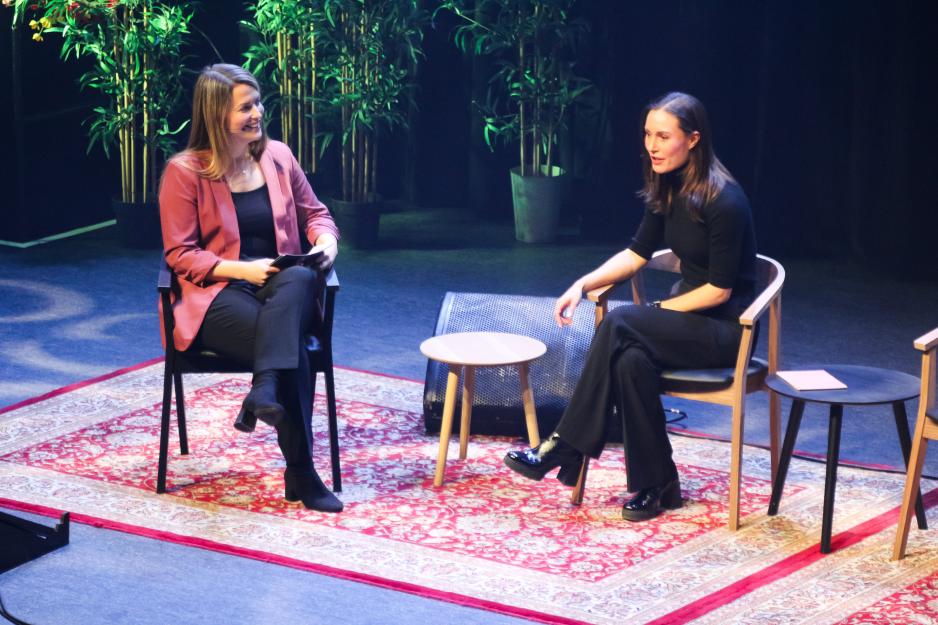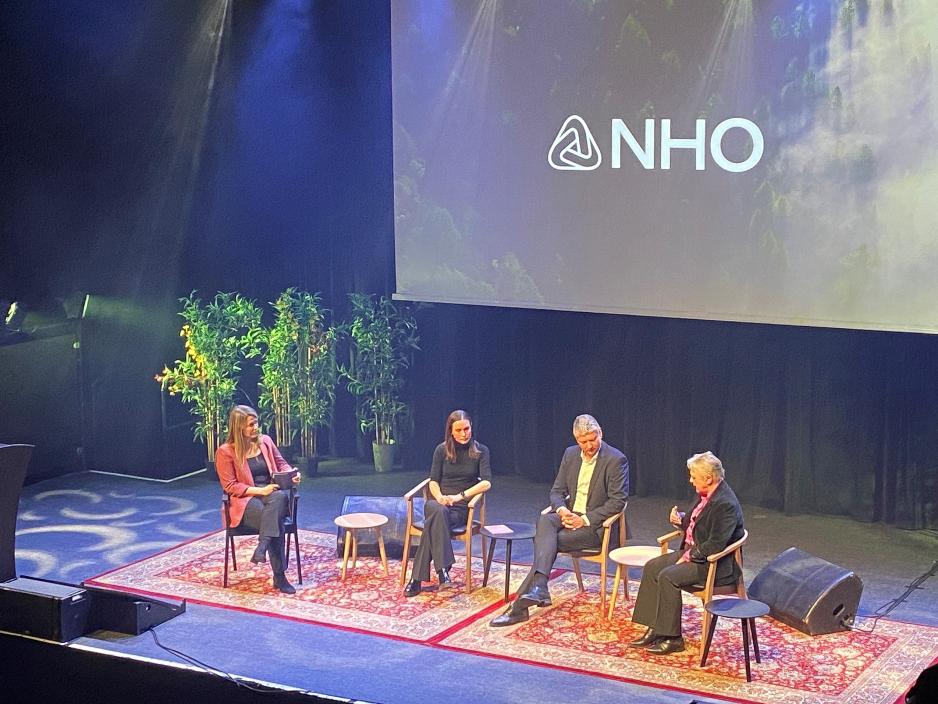Finlands Former Prime Minister: Sanna Marin: "Everything Changed Overnight"

Finland's previous prime minister, Sanna Marin (right), warns against lessening aid to Ukraine in a talk with defense researcher Karen Anna Eggen. (Photo:Trine Jonassen)
Oslo (High North News): Without Russia's attack on Ukraine two years ago, Sweden and Finland would not have applied for NATO membership. "Everything changed overnight when the war came," says Finland's previous prime minister, Sanna Marin.
Sanna Marin (38) was in Oslo this week as the Confederation of Norwegian Enterprise's (NHO) guest in connection with the annual conference on Tuesday, January 9th. On Monday evening, she participated in a conversation in front of a packed audience. The topic was security policy.
Sanna Marin was prime minister of Finland on February 24th, 2022, when Russia invaded Ukraine. An attack that apparently came out of the blue.
Afterward, many believed it was a forewarned attack. Marin, as well.
"We observed the changes happening in Russia over 15 years," says Marin.
Border against NATO
"Everything changed overnight when war came."
Today's Russia is a Russia willing to attack a neighboring country.
Without the war, Sweden and Finland would not have applied for membership.
"We saw that today's Russia is a Russia willing to attack a neighboring country. And what was the only thing that could have stopped them? A border against NATO," says Marin.
188 of 200 parliament members voted in favor.
"That is a lot."
Not a topic
Before the war was a fact, NATO membership was not a topic for Sanna Marin or the Finnish people. When she became prime minister in 2019, she was actually against Finnish membership.

Karen Anna Eggen, Sanna Marin, Stian Jensen fra Nato, and Berit Reiss Andersen participated in the conversation under the auspices of the NHO. (Photo: Trine Jonassen)
"I did not consider it necessary, and neither did the Finnish people."
But when Russia, with which Finland shares a 1340-kilometer-long border, invaded Ukraine, Finland entered into a cooperation with Swedish on a joint NATO application.
Finland is now a member, while Sweden is still awaiting Turkish and Hungarian ratification.
Clear message
"The message we send via the NATO membership is clear; We are finally taking the threat from Russia seriously," says Marin seriously.
The NATO membership was carefully planned with Sweden and Marin calls it a good cooperation. She hopes Sweden will soon follow suit.
Also read (the article continues)
Marin also addressed how vulnerable Europe was due to its dependence on Russian gas.
Dangerous development
The Finn says that the war in Ukraine has shown that Europe cannot make itself dependent on authoritarian regimes regarding energy.
"We could end up in a situation where we are attempted blackmailed. In the future, we must ensure that we have access to our own resources regarding critical elements such as medicine, defense materiel, energy, and technology," Marin points out.
The development in Russia was a forewarned crisis that was allowed to develop in peace and quiet over many years. Now, Marin warns against a similar development in other European countries and NATO – that the opposition, the free press, and the civil society are threatened in many places.
"It is important to talk about stopping the development before it is too late. We see that the press is being gagged, freedom of speech is being restricted, and there is a narrowing toward the only truth. This did not happen overnight, and it is happening in NATO and the EU right now. We must talk about how we can change this," the former prime minister urges.
If Ukraine loses, we will see more war in Europe and the rest of the world.
Russia must lose
She believes Russia must lose the war in Ukraine.
"If Russia does not lose, it sends a signal to other authoritarian regimes. A signal that war pays off and that one can win even when you are in the world's spotlight," she says.
Therefore, she believes the West must not send less help to Ukraine.
"If Ukraine loses, we will see more war in Europe and the rest of the world. Authoritarian regimes only understand strength. Therefore, democratic countries must show that we are willing to defend what we believe in," concludes the 38-year-old.
Last year, Marin's government lost the election in Finland to the right, and she resigned as prime minister and party leader for the Social Democrats. She is currently writing a book, holding lectures, and working for the Tony Blair Institute for Global Change.
Other participants in the conversations were NHO CEO Ole Erik Almlid, Middle East expert Marte Heian-Engfal, NRK Foreign Affairs Editor Sigurd Falkenberg Mikkelsen, NATO Director of Private Office Stian Jenssen, and Chair of the Norwegian Nobel Committee Berit Reiss-Andersen.
The conversation was led by researcher Karen Anna Eggen at the Norwegian Institute for Defence Studies.




